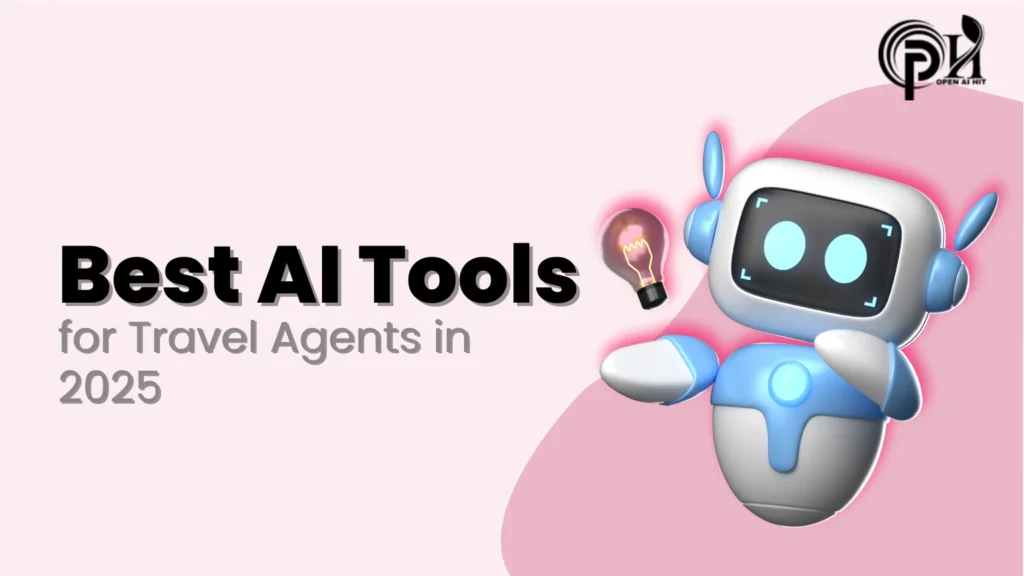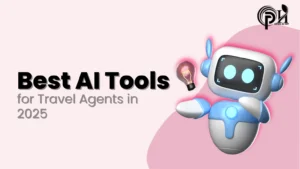In 2025, we have AI tools for every sector of our life and business. These help us in solving complex processes, managing a team, completing a project, and customer support. So the travel agencies also got some fantastic AI tools (Thanks to the developers) that help travel agents and agencies streamline their processes.
But you dont know what are the best AI tools for travel agents or companies. That what this blog is about.
However, it contains the 14 best AI tools for travel companies that can help you ease your travel agency operations. Also after reading this blog, you will be able to streamline and speed up your traveling service.
So keep reading to know them all.
AI Tools for Travel Agencies At a Glance

- Mindtrip.ai
- Picfinder
- Clipdrop
- Legalese Decoder
- Pruvo
- Laxis
- Hotreach
- Copy.ai
- SlidesAI
- Hyperwriteai
- Magic Slides
- Mixo
- Skimit
- ClickUp
14 AI Tools for Travel Agents That You Must Consider
The following are the best AI tools for travel agents as well as for travel agencies:
1. Mindtrip.ai
Mindtrip.ai is an AI-driven platform that assists travellers in planning personalized trips by providing tailored recommendations and itineraries.
Pros
- Offers customized travel suggestions based on user preferences.
- Simplifies trip planning with AI-generated itineraries.
Cons
- May lack integration with all booking platforms.
- User experience can vary depending on AI accuracy.
Also read: Free SEO Writing Tools
2. Picfinder
Picfinder utilizes AI to help travel agents and users discover and source high-quality images relevant to their content needs.
Pros
- Simplifies the process of finding suitable images.
- Enhances content creation with diverse visuals.
Cons
- Image licensing and copyright considerations may arise.
- Search results may not always align perfectly with user intent.
3. Clipdrop
Clipdrop is an AI-powered tool that enables you to extract and digitize real-world objects and images for use in digital travelling projects.
Pros
- Facilitates quick digitization of physical items.
- Integrates seamlessly with various design applications.
Cons
- Requires a stable internet connection for optimal performance.
- May have limitations with complex or detailed objects.
4. Legalese Decoder
Legalese Decoder uses AI to simplify complex legal jargon, making legal documents more understandable for users.
Pros
- Enhances comprehension of legal terms and conditions.
- Assists in making informed decisions regarding legal matters.
Cons
- May not cover all legal nuances or jurisdiction-specific terms.
- Should not replace professional legal advice.
5. Pruvo
Pruvo is an AI-based service that monitors hotel prices after booking and alerts users to potential savings if prices drop. It helps you to see which hotel is best for your clients.
Pros
- Helps travellers secure better deals post-booking.
- Operates automatically without user intervention.
Cons
- Savings depend on price fluctuations, which are not guaranteed.
- May not be compatible with all booking platforms.
6. Laxis
Laxis is an AI meeting assistant that transcribes, summarizes, and provides insights from meetings, aiding in efficient information management.
Pros
- Offers accurate transcription and summarization.
- Enhances productivity by organizing meeting content.
Cons
- Accuracy may be affected by audio quality or accents.
- Privacy concerns regarding sensitive information.
7. Hotreach
Hotreach utilizes AI to automate and optimize outreach campaigns, improving engagement with potential clients.
Pros
- Streamlines communication processes.
- Increases efficiency in lead generation.
Cons
- Automated messages may lack personalization.
- Risk of being marked as spam if not managed properly.
8. Copy.ai
Copy.ai employs AI to generate creative content, assisting in writing tasks such as marketing copy, emails, and social media posts.
Pros
- Accelerates content creation with AI-generated drafts.
- Provides inspiration and ideas for writers.
Cons
- Generated content may require editing for accuracy and tone.
- May not fully capture brand voice without customization.
9. SlidesAI
SlidesAI is an AI tool that transforms text content into engaging presentation slides, simplifying the creation process.
Pros
- Quickly converts text into visually appealing slides.
- Saves time in presentation preparation.
Cons
- Customization options may be limited.
- Designs may not always align with specific branding guidelines.
10. HyperWrite
HyperWrite is an AI writing assistant that aids in drafting and refining content across various formats.
Pros
- Offers real-time writing suggestions and improvements.
- Enhances writing efficiency and quality.
Cons
- May require internet access for full functionality.
- Suggestions may not always align with user intent.
11. Magic Slides
Magic Slides is an AI tool for travel companies that generates professional presentation slides from various input formats, including topics, YouTube videos, PDFs, and text.
Pros
- Creates presentations quickly from diverse sources.
- Supports multiple input formats for flexibility.
Cons
- May require manual adjustments for complex content.
- Design templates might be limited.
12. Mixo
Mixo is one of those AI tools for travel agents and agencies that helps them create custom and professional websites in minutes. By inputting a brief description of your services, Mixo generates a fully functional website in seconds.
Pros
- Rapid website development without coding or design skills.
- Customizable templates suitable for travel agencies, tour guides, and planners.
Cons
- Customization options may be limited compared to traditional web development.
- May require additional SEO optimization for better search engine visibility.
13. Skimit
Skimit is an AI-driven tool that enhances content consumption by summarizing lengthy articles and documents, making it easier for travel professionals to stay informed without investing significant time.
Pros
- Quickly distils essential information from extensive content.
- Supports efficient decision-making by providing concise summaries.
Cons
- Summaries may overlook important details specific to your service.
- Reliance on AI may result in occasional inaccuracies in content interpretation.
- Facilitates quick website creation without coding.
- Integrates subscriber management tools for audience engagement
ClickUp AI helps travel agents plan trips, book flights, and manage tasks.
14. ClickUp
ClickUp is one of those AI tools for travel agents that helps them to plan trips, book flights, and manage tasks.
Pros
- Saves time by automating tasks.
- Offers personalized travel suggestions.
Cons
- May take time to learn.
- Needs clear instructions for best results.
FAQs
- What software do travel agents use?
Travel agents utilize various software to streamline operations:
- Customer Relationship Management (CRM): Manage client interactions.
- Booking Engines: Handle reservations for flights, hotels, etc.
- Itinerary Management: Organize trip details.
- Accounting Software: Track financial transactions.
For example, WeTravel offers features like itinerary building and payment processing.
- How do travel agents use AI?
Travel agents leverage AI to enhance services:
- Personalized Recommendations: Suggest trips based on client preferences.
- Chatbots: Address customer inquiries promptly.
- Predictive Analytics: Forecast travel trends and pricing.
These applications improve efficiency and client satisfaction.
- What is the best software for travel agents?
The ideal software varies by agency needs. However, platforms like WeTravel, offering itinerary building and payment processing, are popular choices.
Additionally, TravelOperations provides CRM and ERP solutions tailored for travel agencies.
The best choice depends on specific operational requirements.
Conclusion
You’ve just explored 14 AI tools for travel agents. These tools can help with trip planning, content creation, and customer service. But to get the best results, don’t rely on them blindly. AI gives you a starting point, but personalizing the output makes it truly useful. Adjust itineraries, refine content, and add your expertise.
This way, you provide better service and build stronger client trust. Use AI as your assistant, not your replacement, for maximum impact.











